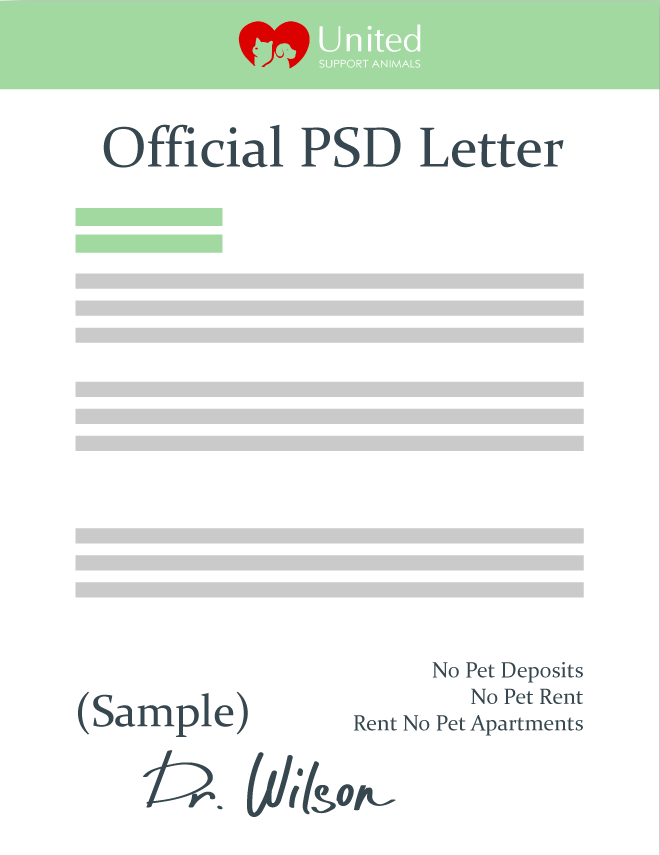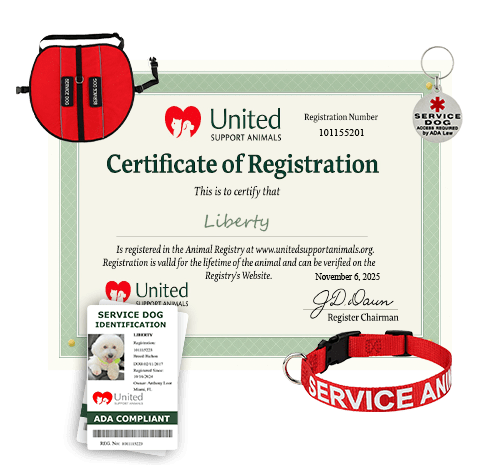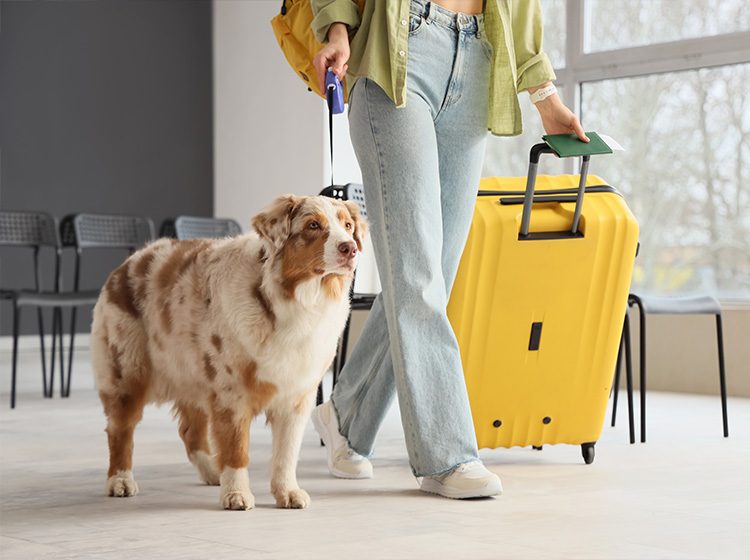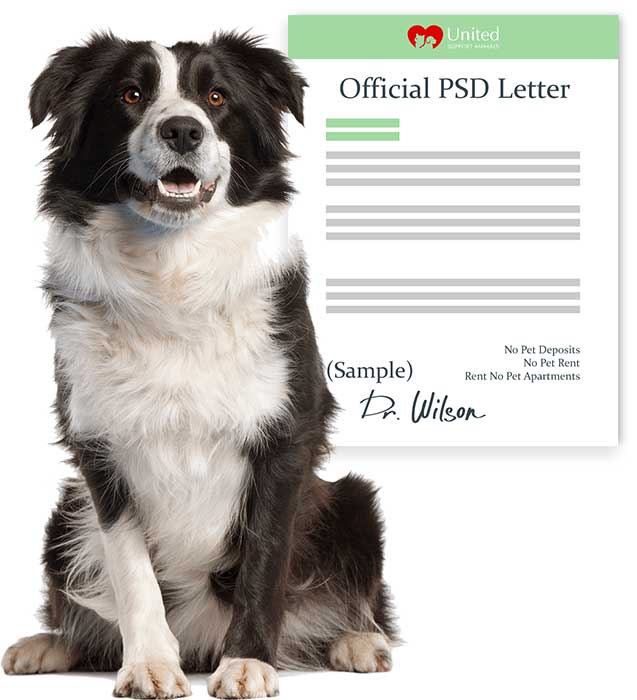Fly with Confidence—Get Your PSD Letter Today
and Travel Hassle-Free with Your Pet!
Featured Packages
TRAVEL
PSD Letter
Fast, simple & secure process to get an Psychiatric Service Dog letter you can trust.


Everything you need to know before flying with your dog for free
It’s been estimated that 1 in 4 Americans currently live with a mental health illness. Some of the more well-known mental health illnesses include depression, anxiety, bipolar disorder, post-traumatic stress disorder (PTSD), and phobias such as social phobia or agoraphobia (the fear of places and situations that might cause panic, helplessness, or embarrassment).
Mental health illnesses such as those above account for many of the top causes of disability in the United States. Individuals who live with a mental health illness will often work with a licensed mental health professional to develop a treatment plan that best suits their needs.
As mental health illnesses are becoming more and more recognized, supported, and understood, those who live with them are increasingly turning to healthy, natural alternatives when developing their treatment plans. This includes the use of assistance animals such as psychiatric service dogs.


Navigating Travel with your Psychiatric Service Dog
Leaving your Psychiatric Service Dog (PSD) behind when you travel can be a stressful and overwhelming experience—especially when you rely on your PSD to manage mental health challenges such as anxiety, PTSD, or panic disorders. These service animals are not just companions; they are trained to provide essential support that helps you stay grounded, calm, and emotionally regulated in everyday life and unfamiliar environments.
A Psychiatric Service Dog is a specially trained assistance animal that performs specific tasks to assist individuals living with mental health conditions. These tasks may include interrupting episodes of anxiety, providing deep pressure therapy, or alerting you to early signs of a panic attack. Whether you’re facing the stress of crowded airports or adjusting to new surroundings, having your PSD by your side can make travel safer, more manageable, and far less daunting.
At United Support Animals, we are dedicated to helping you travel safely and comfortably with your cherished service dog. Our team works to ensure your rights are protected under the law, providing the guidance and documentation you need for a smooth and stress-free journey.
Understanding Your PSD Travel Letter
What Is a Psychiatric Service Dog (PSD)?
A Psychiatric Service Dog (PSD) is a highly trained assistance animal that performs specific tasks to help individuals manage mental health conditions such as anxiety, depression, PTSD, or panic disorders. Unlike Emotional Support Animals (ESAs), which provide comfort through their presence, PSDs are trained to take action—such as interrupting a panic attack, guiding their handler to safety, or reminding them to take medication. These tasks are essential for daily functioning and can be life-changing, especially in high-stress environments like airports or unfamiliar destinations.


What Is a PSD Travel Letter?
A PSD Travel Letter is an official document issued by a Licensed Mental Health Professional (LMHP) confirming that you have a qualifying mental health condition and require a trained psychiatric service dog to assist you during travel. This letter supports your legal right to fly with your PSD under the Air Carrier Access Act (ACAA), provided you also complete the Department of Transportation’s (DOT) required forms. The letter does not replace these forms but plays an important role in verifying your need for a service animal.
Important Note: No Certification or Registration Required
It’s important to know that there is no federally recognized registry or certification for psychiatric service dogs. Websites offering “PSD registration” are often misleading. The only legitimate way to prove your need for a PSD while traveling is through proper documentation—including a PSD Travel Letter—from a licensed mental health professional, along with completed DOT paperwork.
At United Support Animals, we’re committed to helping you and your psychiatric service dog travel safely and comfortably. Our licensed professionals provide valid documentation that supports your rights and ensures you’re well-prepared for a smooth, stress-free journey—every step of the way.
Federally Protected Rights for Psychiatric Service Dogs
Those with service dogs rely on their animal to support them in various situations. The dog cannot perform his job, however, if he’s left at home or tied up outside a store. Service dogs are therefore permitted public access to places where pets or emotional support animals are normally not allowed.
Federal laws protect and support psychiatric service dogs in the following ways:
Public Access Rights
The ADA gives disabled persons the right to be accompanied by a service animal in public spaces. Service dogs must be well behaved, stay on the floor or in a harness, and cannot override public health rules (such as entering a public swimming pool).
Service animal handlers should be aware that religious institutions are exempt from the ADA and are not required to permit access to service dogs. Your state may have specific laws that apply in this case.

Travel Priviledges
The Air Carrier Access Act (ACAA) of 1986 prohibits refusal and discrimination towards individuals based on their disability and their need for a service animal to accompany them. The ACAA allows disabled owners to take their service animal onboard a flight, in the cabin, without paying extra fees.
For those who intend on traveling with their PSD, it’s important to note that the Department of Transportation (DOT) permits airlines the right to ask PSD owners to submit a certification form before departure. The form requires the individual to provide certain certifications, including proof that their PSD has been trained to assist with a disability and is capable of good behavior on a flight. You can learn more about what it’s like to travel with a PSD here.

Fair Housing
The Fair Housing Act (FHA) protects people with disabilities (mental or physical) from discrimination when it comes to accommodation.
Landlords cannot deny housing to anyone based on their diagnosis. People with assistance animals, such as PSDs, are protected under the FHA even if the property has a “no pet” policy.

Educational Facility Access
The Individuals with Disabilities Education Act (IDEA) allows students to bring service dogs such as psychiatric services dogs into places of education.
The Department of Justice has guidelines and rules, but they are not clear-cut, and individual cases need to be discussed depending on your state and school.


Verifying a Psychiatric Service Dog
The symptoms of mental health illnesses are not always visible to others. As such, it’s not uncommon to expect a request for verification, especially when entering a place with a “no dogs” rule.
According to the ADA, the staff of an establishment can legally ask the following questions:
1. Is the dog a service animal required because of a disability?
2. What work or task has the dog been trained to perform?
No one has the right to ask you to identify your specific disability or ask that your pet demonstrate their skill.
As previously mentioned, the DOT gives airlines the right to also request further certifications when flying with your pet. Make sure you follow all requirements and provide these certifications beforehand, as to allow for more stress-free travel.
While not a requirement, it can also be helpful to fit your animal with a service dog vest, service dog harness, or service dog ID card.
Emotional Support Animals vs. Psychiatric Service Dogs:
What’s the Difference?
Over the centuries, dogs have performed many jobs to assist their human companions. As a result, there are many types of assistance animals in today’s society.
Here are the four main types of assistance animals and what their job typically encompasses.

A Service Dog receives extensive training to help individuals with tasks or activities that their disability limits or prevents them from doing on their own. Under the American’s with Disabilities Act (ADA), service dogs can accompany their owners in a wide range of public areas because of the tasks they do. One of the most common types of service dogs is a seeing-eye dog for the visually impaired.

A Psychiatric Service Dog also receives specialized training in order to perform certain tasks for an individual, the only difference being that a PSD usually helps those with unseen, unnoticeable disabilities (anxiety, panic, post-traumatic stress, depression). Just like other service dogs, PSDs have public access rights and certain travel and housing privileges.

Emotional Support Animals are companion animals whose presence can help alleviate symptoms of mental illness. Dogs and cats are the most common types of ESAs and require no formal training to be recognized as an assistance animal. However, ESAs don’t have the same federally protected rights as trained service dogs and may not always be able to accompany their owners in public places or on planes, based on the guidelines that the specific establishment or airline has in place.

Therapy Dogs can often be found in hospitals or nursing homes. The presence of a therapy dog can bring comfort, social interaction, reduced stress, and joy into patients’ or residents’ lives. Therapy dogs usually undergo specialized training in order to work in these special settings. Another type of therapy dog is a ‘Comfort Dog,’ which visits disaster areas or areas of crisis to calm victims and bring them comfort.
How to Get Your PSD Travel Letter
with United Support Animals
Our process is simple, efficient, and designed with your needs in mind:

Quick Online Pre-screening
Answer a few simple questions to help us understand your emotional support animal needs and determine if you may qualify for an PSD letter.

Connect with a Licensed
Mental Health Professional
Have a personalized consultation via phone or live video with one of our licensed mental health professionals. This is a risk-free consultation; you only pay if you are approved.

Receive Your PSD Letter!
If approved, your official, legitimate PSD letter will be sent to you promptly via email, typically within 24-48 hours. You can then print and use it immediately.
Ready to Travel?
Don’t let travel restrictions limit your comfort and well-being. Take the first step towards traveling freely with your psychiatric service dog.

Important Considerations for PSD Owners
A licensed mental health professional (LMHP) can prescribe an assistance animal such as a psychiatric service dog as part of an individual’s treatment plan.
The ADA gives disabled persons, including those with a mental health disability, the right to be accompanied by a psychiatric service animal in public spaces. The service dog must be well behaved, stay on the floor or in a harness, and cannot override public health rules (such as entering a public swimming pool). Religious institutions are exempt from the ADA and are not required to permit access to service dogs.
Psychiatric service dogs assist their owner by performing tasks that can help alleviate the individual’s stress, anxiety, depression, and/or other symptoms. From retrieving medication and assisting with emotional regulation to conducting room searches or serving as a buffer in overwhelming situations or crowded spaces, PSDs can be individually trained to perform several tasks for their handler’s unique needs.




